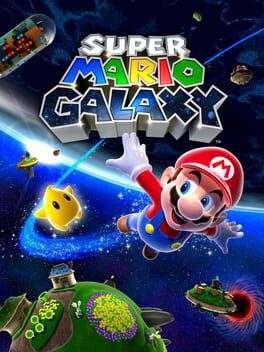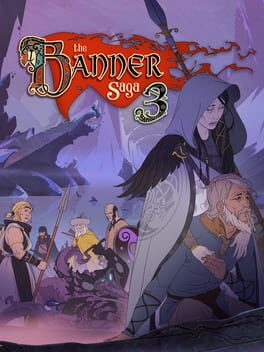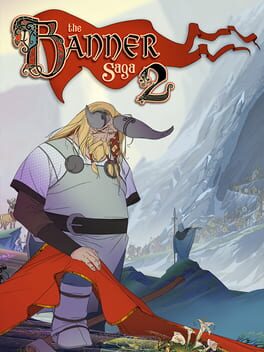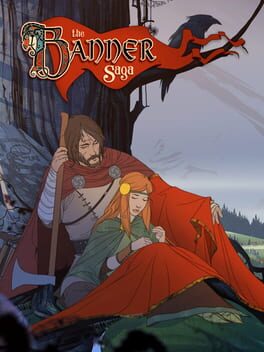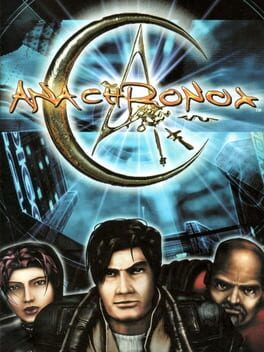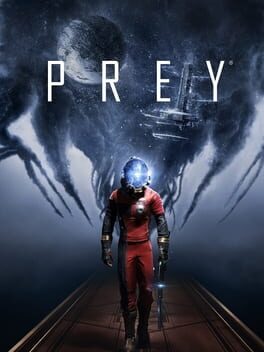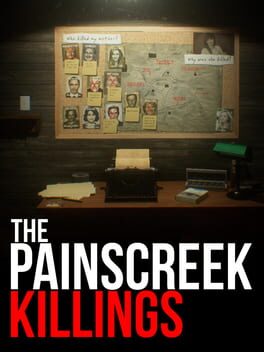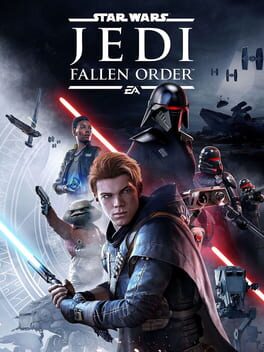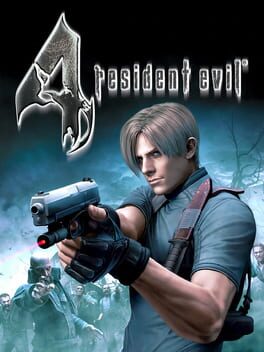gaming_wookiee
2016
2007
This is the first Nintendo game I've ever played and finished, since I've always been a PC gamer but thanks to the incredible Dolphin emulator (and this great control scheme for the Xbox Series controller I was finally able to experience this amazing classic!
It's hard to put into the words the pure joy (and sometimes terror) one feels when running, jumping and spinning through the game's many creatively challenging levels. There isn't a single level that feels like it wasn't made with passion, even if the quality definitely varies from level to level. Still, even the weakest levels are great fun to play through if a little bit tedious at times.
I never did get completely used to the controls, perhaps because this is my first time playing a 3D platformer with fixed camera angles. I often found it difficult to jump precisely onto a surface, with only Mario's tiny shadow as an indicator of where I would land (often times I'd plummet into the cold void of space due to the smallest miscalculation). Also, while the spherical platforms are amazing innovations the larger spheres still felt disorienting several hours in and Mario felt very difficult to control in these areas. However, these are issues that I'm sure can be rectified by playing through the game a few more times and really getting used to the control scheme.
The story, which is sprinkled in throughout the game in the form of these lovely storybook pages (as well as longer cutscenes in the beginning and ending) was surprisingly thoughtful and touching. It makes use of the vastness and exciting (as well as terrifying) possibilities of space as an analogy for the excitement of venturing out into the world after growing up to find our place.
It's hard to put into the words the pure joy (and sometimes terror) one feels when running, jumping and spinning through the game's many creatively challenging levels. There isn't a single level that feels like it wasn't made with passion, even if the quality definitely varies from level to level. Still, even the weakest levels are great fun to play through if a little bit tedious at times.
I never did get completely used to the controls, perhaps because this is my first time playing a 3D platformer with fixed camera angles. I often found it difficult to jump precisely onto a surface, with only Mario's tiny shadow as an indicator of where I would land (often times I'd plummet into the cold void of space due to the smallest miscalculation). Also, while the spherical platforms are amazing innovations the larger spheres still felt disorienting several hours in and Mario felt very difficult to control in these areas. However, these are issues that I'm sure can be rectified by playing through the game a few more times and really getting used to the control scheme.
The story, which is sprinkled in throughout the game in the form of these lovely storybook pages (as well as longer cutscenes in the beginning and ending) was surprisingly thoughtful and touching. It makes use of the vastness and exciting (as well as terrifying) possibilities of space as an analogy for the excitement of venturing out into the world after growing up to find our place.
2018
This review contains spoilers
Overall, this was a great game that was really effective at closing out an epic story with its limited budget, although it does falter a bit in the last half hour due to those same limitations.
Strengths
Tension Building
This is the last act of the story, and it definitely feels like it. Compared to the first 2 parts, where you're mostly just fumbling in the dark and trying to stay alive, the stakes are finally clear and there's an actual goal to build towards. Better yet, the amount of time you spend on your journey actually matters and can have terrible consequences, much like the time-sensitive storyline of the original Fallout game but handled much better. Although there is kind of a big plot revelation towards the end of the game, I felt that the most impactful part of the game is when it suddenly cuts to black and tells you that Arberrang will fall unless your heroes can make it in time, and starts listing out almost all the choices you've made up until that point and how much time it can buy you. With just some simple numbers and animated text, it was able to arouse feelings of dread and excitement, which is no small feat indeed.
Best combat in the trilogy
People seem to have mixed feelings about the combat in these games, but I've always found them really addicting since I'm not exactly an expert strategy gamer and am easily engrossed by any combat system that requires even a modicum of brain power. The combat in this third entry is easily the best in the series since by this point most of your characters are at a pretty high rank and you can really unlock their full potential using the new "Title" system that lets you choose a title for your heroes that gives them specific buffs. With your heroes at such a high power level, some of the most powerful and satisfying kills in the trilogy are achieved here (there's even an achievement for dealing 100 Break damage, which I can't even imagine). Of course, the enemies will be tougher as well although thankfully you're never forced into fights that come close to Eyeless in the second game. A new wave-based system is introduced where in most fights you can choose to flee after defeating the first wave of enemies, or continue fighting (with the option to switch out heroes) until a boss enemy arrives that will drop special gear. I myself never tried fighting more than 1 wave since my heroes were getting absolutely battered, but I'm eager to try holding out longer when I do play the trilogy again.
Weaknesses
Stoic faces
Although the visual-novel style conversations work well enough for the most part, they definitely suck out a lot of gravity from some of the more "epic" interactions because all the characters constantly wear a static, unchanging expression on their face. While this works well for the varl characters, it does not for the human characters. There's a very important talk between Iver and Eyvind at the end of the game, and Eyvind should be a complete mess yet he's still wearing the exact same expression while he's making the most difficult choice of his life! I know that this is a result of the limited budget, but it definitely takes away from what is otherwise a great conclusion (at least on paper). Games like Disco Elysium manage to circumvent this by having the camera be far enough from the characters that a lot of the character's expressions can be left to the player's imagination, while in this game the character's faces are front and center.
No Ending Slides
This is more of a personal nitpick, since the developers seemed to intentionally leave the state of the world after the climax up to the player's interpretation (that, or they ran out of time). But I really wished that the ending was longer and more drawn out, especially since we spent 30 hours across 3 games building up to this moment. I don't have exact measurements, but the ending of the game probably lasts little more than 5 minutes and all we get is that the world's been saved and the surviving characters will have to work together to rebuild it again (at least in the ending I got). Seeing as the trilogy begins with scrolling text that tells us about the state of the world, it would have been fitting to close it out with text that changes depending on our choices. It really feels like a missed opportunity, because the game's engine could clearly have supported something along the lines of the ending slides of Fallout or Dragon Age.
Strengths
Tension Building
This is the last act of the story, and it definitely feels like it. Compared to the first 2 parts, where you're mostly just fumbling in the dark and trying to stay alive, the stakes are finally clear and there's an actual goal to build towards. Better yet, the amount of time you spend on your journey actually matters and can have terrible consequences, much like the time-sensitive storyline of the original Fallout game but handled much better. Although there is kind of a big plot revelation towards the end of the game, I felt that the most impactful part of the game is when it suddenly cuts to black and tells you that Arberrang will fall unless your heroes can make it in time, and starts listing out almost all the choices you've made up until that point and how much time it can buy you. With just some simple numbers and animated text, it was able to arouse feelings of dread and excitement, which is no small feat indeed.
Best combat in the trilogy
People seem to have mixed feelings about the combat in these games, but I've always found them really addicting since I'm not exactly an expert strategy gamer and am easily engrossed by any combat system that requires even a modicum of brain power. The combat in this third entry is easily the best in the series since by this point most of your characters are at a pretty high rank and you can really unlock their full potential using the new "Title" system that lets you choose a title for your heroes that gives them specific buffs. With your heroes at such a high power level, some of the most powerful and satisfying kills in the trilogy are achieved here (there's even an achievement for dealing 100 Break damage, which I can't even imagine). Of course, the enemies will be tougher as well although thankfully you're never forced into fights that come close to Eyeless in the second game. A new wave-based system is introduced where in most fights you can choose to flee after defeating the first wave of enemies, or continue fighting (with the option to switch out heroes) until a boss enemy arrives that will drop special gear. I myself never tried fighting more than 1 wave since my heroes were getting absolutely battered, but I'm eager to try holding out longer when I do play the trilogy again.
Weaknesses
Stoic faces
Although the visual-novel style conversations work well enough for the most part, they definitely suck out a lot of gravity from some of the more "epic" interactions because all the characters constantly wear a static, unchanging expression on their face. While this works well for the varl characters, it does not for the human characters. There's a very important talk between Iver and Eyvind at the end of the game, and Eyvind should be a complete mess yet he's still wearing the exact same expression while he's making the most difficult choice of his life! I know that this is a result of the limited budget, but it definitely takes away from what is otherwise a great conclusion (at least on paper). Games like Disco Elysium manage to circumvent this by having the camera be far enough from the characters that a lot of the character's expressions can be left to the player's imagination, while in this game the character's faces are front and center.
No Ending Slides
This is more of a personal nitpick, since the developers seemed to intentionally leave the state of the world after the climax up to the player's interpretation (that, or they ran out of time). But I really wished that the ending was longer and more drawn out, especially since we spent 30 hours across 3 games building up to this moment. I don't have exact measurements, but the ending of the game probably lasts little more than 5 minutes and all we get is that the world's been saved and the surviving characters will have to work together to rebuild it again (at least in the ending I got). Seeing as the trilogy begins with scrolling text that tells us about the state of the world, it would have been fitting to close it out with text that changes depending on our choices. It really feels like a missed opportunity, because the game's engine could clearly have supported something along the lines of the ending slides of Fallout or Dragon Age.
2016
This review contains spoilers
I wasn't too sure what to expect going into the sequel to the Banner Saga, but it becomes clear after starting it up that each game in this trilogy isn't so much a standalone experience but a part of a larger whole. As such, the gameplay and user interface is virtually the same as the first game with a few tweaks here and there, in the same vein as an expansion pack for the original title. There are several new classes of fighters, and even a new race that have their own unique combat abilities that shake up the pace of combat.
There is definitely a LOT more combat in this game than the first, especially towards the end where you're going from one battle to another with almost no rest in between. I don't know if it's because of the choices I made it which got me into more fights, but I definitely preferred the more deliberate pace of the first game. The final battle in the first game was the toughest in the whole game, whereas in the sequel it feels like you're going against similar odds on a much more frequent basis.
Thankfully, the combat still feels engaging thanks to the new character classes, which allow for new types of combos and have the potential to cause a devastating amount of damage in a single turn if used correctly. Even after 20 or so hours playing these games, I still haven't quite mastered the combat but it's still a very addicting system. My frustration towards the end of the game was not really because the combat was bad but because I was itching to get to the ending and was annoyed that I kept being thrust into more battles.
I definitely have a bit of an issue with how Renown, the currency you use to buy supplies and upgrade your heroes, is balanced. I was delighted to find out that the amount of Renown you need to level up characters has been significantly reduced, but at the same time the Renown your earn from completing battles seems to also be a bit less than before (note that this was just a feeling, I didn't actually do any numerical comparisons but I swear I never earned more than 10 renown per battle). On the other hand, you can gain a whole lot of Renown (usually more than 20) just by completing training challenges (a very fun and welcome addition to the Training tent in your camp) or even making certain narrative choices. This definitely makes battles feel a bit less rewarding than the first game.
Speaking of the ending, the game doesn't really have one. Unlike the first game, which has a more definitive stopping point with all your characters together, this game ends with multiple caravans scattered across different locations, and I felt I had even more questions than answers compared to the first game (which left a lot of mysteries unsolved, but that felt more fitting since it was the first game in a trilogy). That's not to say that this game doesn't have any substantial narrative, far from it. The Banner Saga 2 feels a lot longer than the first, featuring way more characters and important revelations. But even after all we find out during the course of the game, the ending is definitely a case of, "Where do we go from here?" It doesn't make for quite a satisfying ending for this game, but it definitely makes me excited to play the final entry in the trilogy. I really hope that it can somehow wrap up all this complicated plot in a satisfying way.
One final note which is more of a personal nitpick, I wish that you could have more conversations and lighthearted interactions with your clan whenever you set up camp. There are instances in the game where you can stop the caravan to celebrate certain events, and I wish that this would unlock more conversations or funny little encounters in the same vein as Red Dead Redemption 2 or Dragon Age: Origins. In a game which is all about trying to get by while the world ends, some levity is needed to break the tension, and it's a bit disappointing that the game only provides this in the form of short bits of text instead of more substantial scenarios. It would also help players feel more connected to the characters (who really start to drop off like flies throughout the journey). However, I understand that this is ultimately an independent game that was made by just a handful of people, and that the resources to add more character interaction probably just weren't there during production.
There is definitely a LOT more combat in this game than the first, especially towards the end where you're going from one battle to another with almost no rest in between. I don't know if it's because of the choices I made it which got me into more fights, but I definitely preferred the more deliberate pace of the first game. The final battle in the first game was the toughest in the whole game, whereas in the sequel it feels like you're going against similar odds on a much more frequent basis.
Thankfully, the combat still feels engaging thanks to the new character classes, which allow for new types of combos and have the potential to cause a devastating amount of damage in a single turn if used correctly. Even after 20 or so hours playing these games, I still haven't quite mastered the combat but it's still a very addicting system. My frustration towards the end of the game was not really because the combat was bad but because I was itching to get to the ending and was annoyed that I kept being thrust into more battles.
I definitely have a bit of an issue with how Renown, the currency you use to buy supplies and upgrade your heroes, is balanced. I was delighted to find out that the amount of Renown you need to level up characters has been significantly reduced, but at the same time the Renown your earn from completing battles seems to also be a bit less than before (note that this was just a feeling, I didn't actually do any numerical comparisons but I swear I never earned more than 10 renown per battle). On the other hand, you can gain a whole lot of Renown (usually more than 20) just by completing training challenges (a very fun and welcome addition to the Training tent in your camp) or even making certain narrative choices. This definitely makes battles feel a bit less rewarding than the first game.
Speaking of the ending, the game doesn't really have one. Unlike the first game, which has a more definitive stopping point with all your characters together, this game ends with multiple caravans scattered across different locations, and I felt I had even more questions than answers compared to the first game (which left a lot of mysteries unsolved, but that felt more fitting since it was the first game in a trilogy). That's not to say that this game doesn't have any substantial narrative, far from it. The Banner Saga 2 feels a lot longer than the first, featuring way more characters and important revelations. But even after all we find out during the course of the game, the ending is definitely a case of, "Where do we go from here?" It doesn't make for quite a satisfying ending for this game, but it definitely makes me excited to play the final entry in the trilogy. I really hope that it can somehow wrap up all this complicated plot in a satisfying way.
One final note which is more of a personal nitpick, I wish that you could have more conversations and lighthearted interactions with your clan whenever you set up camp. There are instances in the game where you can stop the caravan to celebrate certain events, and I wish that this would unlock more conversations or funny little encounters in the same vein as Red Dead Redemption 2 or Dragon Age: Origins. In a game which is all about trying to get by while the world ends, some levity is needed to break the tension, and it's a bit disappointing that the game only provides this in the form of short bits of text instead of more substantial scenarios. It would also help players feel more connected to the characters (who really start to drop off like flies throughout the journey). However, I understand that this is ultimately an independent game that was made by just a handful of people, and that the resources to add more character interaction probably just weren't there during production.
2014
A great experience that I enjoyed from start to finish. Combining the turn-based combat of XCOM, the worldbuilding and narrative decisions of Dragon Age with a gorgeous hand-drawn art-style (which I've never seen in a game before, but I haven't played that many) results in a really addictive experience that can be completed in around 10 hours.
10 hours might seem short for a narrative RPG, but considering that this is the first part of a trilogy that isn't an issue. In fact, after playing so many 50-hour RPGs that often contain a lot of padding, it is refreshing to play a game that is so lean and well-paced.
Due to its shorter length, there are probably less than 20 combat encounters in the entire game (I'm just guessing at this number) but it's because of this that I never felt like the combat got repetitive. Granted, I am definitely a casual turn-based strategy game player (the only other game of this type that I've played is XCOM: Enemy Unknown) so I found the combat to always be delightful and satisfying to play. However, I've read that veterans of the genre may find it too simple, so that's important to bear in mind.
It's hard to really say anything about the story, because in terms of plot it's mostly just setting up the later installments. By the end of the game, we're not even sure what the real threat is. Overall, the story really just consists of you and your caravan travelling to different places, trying to escape the enemies pursuing you. The strength of the writing really shines in the smaller stories that occur during your travels. While your caravan is travelling through the world (which you watch happen on the screen in real-time, which may be boring for some players but the beautiful landscape art was always a joy to watch for me), sometimes text will pop-up informing you of some conflict that has happened in the caravan or some discovery you've made on the journey (I'm not sure if this is randomly picked from a list or scripted). You then have to make choices, as the leader of the caravan, of how to deal with the problem. There never seems to be a right choice, but there are always multiple ways to approach the problem that can fit the type of leader you are role-playing as. The choices never have an immediate effect on the story, and the game purposefully delays the effect so that you can't save-scum and have to live with your choices. Without spoiling anything, I made a choice towards the end of the game that led to an awful consequence which I had not expected at all and almost made me want to restart the chapter just to get a different outcome. I ended up stopping myself because that would take away the impact of that ending, and I think that the game wants players to accept the consequences of their action, not just game the system to get the most optimal outcome.
The characters are all strong enough to get you to care about them, but due to the short length of the game and the small number of interactions you have with them, the relationships are not as deep as some longer RPGs like Mass Effect or Dragon Age. I'm sure this won't be a problem after the roughly 20 hours of gameplay that the next 2 games promise.
10 hours might seem short for a narrative RPG, but considering that this is the first part of a trilogy that isn't an issue. In fact, after playing so many 50-hour RPGs that often contain a lot of padding, it is refreshing to play a game that is so lean and well-paced.
Due to its shorter length, there are probably less than 20 combat encounters in the entire game (I'm just guessing at this number) but it's because of this that I never felt like the combat got repetitive. Granted, I am definitely a casual turn-based strategy game player (the only other game of this type that I've played is XCOM: Enemy Unknown) so I found the combat to always be delightful and satisfying to play. However, I've read that veterans of the genre may find it too simple, so that's important to bear in mind.
It's hard to really say anything about the story, because in terms of plot it's mostly just setting up the later installments. By the end of the game, we're not even sure what the real threat is. Overall, the story really just consists of you and your caravan travelling to different places, trying to escape the enemies pursuing you. The strength of the writing really shines in the smaller stories that occur during your travels. While your caravan is travelling through the world (which you watch happen on the screen in real-time, which may be boring for some players but the beautiful landscape art was always a joy to watch for me), sometimes text will pop-up informing you of some conflict that has happened in the caravan or some discovery you've made on the journey (I'm not sure if this is randomly picked from a list or scripted). You then have to make choices, as the leader of the caravan, of how to deal with the problem. There never seems to be a right choice, but there are always multiple ways to approach the problem that can fit the type of leader you are role-playing as. The choices never have an immediate effect on the story, and the game purposefully delays the effect so that you can't save-scum and have to live with your choices. Without spoiling anything, I made a choice towards the end of the game that led to an awful consequence which I had not expected at all and almost made me want to restart the chapter just to get a different outcome. I ended up stopping myself because that would take away the impact of that ending, and I think that the game wants players to accept the consequences of their action, not just game the system to get the most optimal outcome.
The characters are all strong enough to get you to care about them, but due to the short length of the game and the small number of interactions you have with them, the relationships are not as deep as some longer RPGs like Mass Effect or Dragon Age. I'm sure this won't be a problem after the roughly 20 hours of gameplay that the next 2 games promise.
2001
This review contains spoilers
A real diamond in the rough. The parts of this game that I love the most are when you're just walking around and talking to people, exploring the incredibly creative environments and learning more about the world. That probably takes up about 50% of this game. The other half consists of turn-based combat in the style of JRPGs and the obtuse puzzles of classic point-and-click adventure games. The combat isn't too bad, and can be pretty satisfying at times (especially the area-of-effect attacks that can damage whole groups of enemies at once). It really is the puzzles that absolutely bring down the game for me. They are designed in such a confusing and frustrating way, often requiring you to navigate from one side of the map to the other and picking up items that are barely visible. And the worst thing is that the puzzle solutions are usually pretty dry and don't incorporate any of the charm or humor of the main story (something done much
better in Telltale's Sam and Max games). I eventually had to give up and use a guide to finish parts of the game, but even then it was still difficult to follow. The puzzles ruin the pacing of an otherwise intriguing and epic story.
I ended up giving up very close to the end of the game because I got to a point where some of my characters couldn't progress due to being under-equipped, and I did not want to re-do a puzzle section that had proved extremely frustrating. I watched the ending cutscene on YouTube instead, which was well-done but since the game ends on a cliffhanger there isn't really any feeling of resolution.
So it's a testament to the world-building, characters and overall writing that I'm still glad that I played this game, even if parts of it made me want to tear my hair out. I've simply never played a game that had so much variety, that could contain so many creative and interesting ideas inside one package. I can only imagine what plans they had for the sequel, but this definitely could have been the start of something special. We definitely got a spiritual successor to this game in the Mass Effect trilogy, which I definitely vastly prefer to this game, but I definitely can imagine an alternate universe where Anachronox got its own trilogy and was able to continue the story of Sly Boots and his friends but with more streamlined gameplay and creative puzzles.
better in Telltale's Sam and Max games). I eventually had to give up and use a guide to finish parts of the game, but even then it was still difficult to follow. The puzzles ruin the pacing of an otherwise intriguing and epic story.
I ended up giving up very close to the end of the game because I got to a point where some of my characters couldn't progress due to being under-equipped, and I did not want to re-do a puzzle section that had proved extremely frustrating. I watched the ending cutscene on YouTube instead, which was well-done but since the game ends on a cliffhanger there isn't really any feeling of resolution.
So it's a testament to the world-building, characters and overall writing that I'm still glad that I played this game, even if parts of it made me want to tear my hair out. I've simply never played a game that had so much variety, that could contain so many creative and interesting ideas inside one package. I can only imagine what plans they had for the sequel, but this definitely could have been the start of something special. We definitely got a spiritual successor to this game in the Mass Effect trilogy, which I definitely vastly prefer to this game, but I definitely can imagine an alternate universe where Anachronox got its own trilogy and was able to continue the story of Sly Boots and his friends but with more streamlined gameplay and creative puzzles.
2017
The reason why I have 40 hours of playtime isn't because I've done multiple complete playthroughs of this game, but rather because I started 2 playthroughs which I gave up on 10 hours in. The game starts off amazing, but then the same thing always happens: I become impatient to get to the end so I can find out the truth about Talos I. So I start rushing through the game and play it like an action first-person shooter until I get to a point where I'm out of resources and am surrounded by high level enemies, at which point I rage quit. Unlike other games, I always quit with the intention of starting over and doing things differently, because it always feels like there's something wrong with the way I'm playing and not the game itself.
This is not a game that you can rush through, at least not in the first 10 hours or so. While in my previous playthroughs I was barely scraping by with enough ammo to count on one hand, in my latest playthrough my inventory was always overflowing with resources. All I had to do was ignore the main story (which usually makes the most sense in other games) and take the time to explore every area that was available to me. Not only did I discover many powerful weapons hours before I did in the previous playthroughs, but I became much more invested in the story since I collected the emails and audio logs of the unfortunate employees on the space station. Before, I wanted to uncover the truth of Talos I by getting to the end of the game, but this wasn't really necessary: the truth was all around me, all I had to do was look.
I also realized that combat in this game does not rely on mobility and reflexes alone, but rather knowing the correct "counter" to each enemy. Enemies in the early parts of the game feel so difficult because they're still unknown entities. You have to learn their attacks (which actually aren't too complicated) by observing them, and then figuring out which tools you can use to exploit their weaknesses. People have described the combat as being more like a puzzle, since once you figure out the correct "counter" for each enemy the combat becomes much easier. Having the enemies become trivial might seem like a bad thing, but I loved this since it made exploration much easier and and gives the player that feeling of having mastered the space station, becoming the unstoppable force that even the monsters fear.
The game has been labelled as an immersive sim, but I can't really tell this from just one completed playthrough. For me, it seems like the best way to play the game is to slowly explore every area and invest in skills that help you unlock more of the space station (e.g. hacking, repair), which kind of goes against the whole "there is no right way to play" philosophy of immersive sims. But there are so many other possible ways that I've never even tried yet. I didn't touch any of the alien abilities, didn't commit to a single playstyle (I ended up with a mixture of stealth and combat skills that definitely gave me an unfair advantage) and left a lot of side quests unfinished. Games like this are designed to be played more than once, which I definitely look forward to doing.
The only major flaw with this game (it's not the ending, which I thought tied the whole thing together rather nicely) is the loading screens and how they factor into the endgame. The entire space station is made up of several interconnected areas, but they are all separated by a loading screen. It's not bad in the first 10 hours of the game, when you spend a lot of time in each area. But in the final hour of the game, you have to quickly go through several of these areas to complete objectives (in fact, there are even timers on some objectives) which means you'll be seeing loading screens every minute! It really hurt the intense energy of the climax and made the finale feel more tedious than exciting. I know that the loading screens are simply a hardware limitation, but I wish that the finale could have been designed in a way that reduced the need to have to see so many of them in such quick succession.
Overall, Prey is a terrific game that I am sure will only become better with subsequent playthroughs. If this ever gets remade in the future without loading screens between areas, it will be pretty much perfect.
This is not a game that you can rush through, at least not in the first 10 hours or so. While in my previous playthroughs I was barely scraping by with enough ammo to count on one hand, in my latest playthrough my inventory was always overflowing with resources. All I had to do was ignore the main story (which usually makes the most sense in other games) and take the time to explore every area that was available to me. Not only did I discover many powerful weapons hours before I did in the previous playthroughs, but I became much more invested in the story since I collected the emails and audio logs of the unfortunate employees on the space station. Before, I wanted to uncover the truth of Talos I by getting to the end of the game, but this wasn't really necessary: the truth was all around me, all I had to do was look.
I also realized that combat in this game does not rely on mobility and reflexes alone, but rather knowing the correct "counter" to each enemy. Enemies in the early parts of the game feel so difficult because they're still unknown entities. You have to learn their attacks (which actually aren't too complicated) by observing them, and then figuring out which tools you can use to exploit their weaknesses. People have described the combat as being more like a puzzle, since once you figure out the correct "counter" for each enemy the combat becomes much easier. Having the enemies become trivial might seem like a bad thing, but I loved this since it made exploration much easier and and gives the player that feeling of having mastered the space station, becoming the unstoppable force that even the monsters fear.
The game has been labelled as an immersive sim, but I can't really tell this from just one completed playthrough. For me, it seems like the best way to play the game is to slowly explore every area and invest in skills that help you unlock more of the space station (e.g. hacking, repair), which kind of goes against the whole "there is no right way to play" philosophy of immersive sims. But there are so many other possible ways that I've never even tried yet. I didn't touch any of the alien abilities, didn't commit to a single playstyle (I ended up with a mixture of stealth and combat skills that definitely gave me an unfair advantage) and left a lot of side quests unfinished. Games like this are designed to be played more than once, which I definitely look forward to doing.
The only major flaw with this game (it's not the ending, which I thought tied the whole thing together rather nicely) is the loading screens and how they factor into the endgame. The entire space station is made up of several interconnected areas, but they are all separated by a loading screen. It's not bad in the first 10 hours of the game, when you spend a lot of time in each area. But in the final hour of the game, you have to quickly go through several of these areas to complete objectives (in fact, there are even timers on some objectives) which means you'll be seeing loading screens every minute! It really hurt the intense energy of the climax and made the finale feel more tedious than exciting. I know that the loading screens are simply a hardware limitation, but I wish that the finale could have been designed in a way that reduced the need to have to see so many of them in such quick succession.
Overall, Prey is a terrific game that I am sure will only become better with subsequent playthroughs. If this ever gets remade in the future without loading screens between areas, it will be pretty much perfect.
A great detective game that really shakes up the walking simulator genre by giving you a relatively open town to explore filled with puzzles to solve and doors to unlock. There is no fast travel and no quest markers. You have to navigate the town on your own (with the help of a static in-game map), take notes to keep track of timelines and characters (if you play the game, make sure to start writing down a timeline of events early on because it helps a lot in keeping the story straight. I had a big revelation when I realized that 1 event took place the same day as a certain diary entry.) Admittedly, beating the game depends on finding a number of keys which can sometimes turn into a bit of a pixel hunt (I got badly stuck on two occasions because I had forgotten to open a drawer). In addition, puzzle solutions are sometimes spelled out for you in some notes (as well as an important revelation later on in the game).
On the whole, this is a great game that really showed what is possible with the walking simulator genre...until the ending. Without spoiling anything, many things about the ending didn't make sense and felt at odds with the tone of the rest of the game. On the whole, I really admire this game and can't wait to see what the team at EQ studios puts out next, and as a debut title this is an outstanding game. It's just the ending (which has proved divisive amongst most players) didn't quite work for me, even though I admire the ambition of the team for trying something unexpected.
If it weren't for the fact that this game was developed by an independent studio who were learning the basics of game development while they were making the game (you can check out their development diaries on their blog), I might have rated it a bit lower. However, as a debut title this is amazing and it is rare for a first-time developer to make a game that is able to mostly deliver on what it promises.
On the whole, this is a great game that really showed what is possible with the walking simulator genre...until the ending. Without spoiling anything, many things about the ending didn't make sense and felt at odds with the tone of the rest of the game. On the whole, I really admire this game and can't wait to see what the team at EQ studios puts out next, and as a debut title this is an outstanding game. It's just the ending (which has proved divisive amongst most players) didn't quite work for me, even though I admire the ambition of the team for trying something unexpected.
If it weren't for the fact that this game was developed by an independent studio who were learning the basics of game development while they were making the game (you can check out their development diaries on their blog), I might have rated it a bit lower. However, as a debut title this is amazing and it is rare for a first-time developer to make a game that is able to mostly deliver on what it promises.
A really solid action adventure game that blends multiple genres in a way that makes it a textbook case of "better than the sum of its parts" (much like the original Star Wars films). I understand why Respawn chose not to try anything new with this game, since being a single player game with no microtransactions in 2019 (published by EA no less) was already ground breaking in its own right, and the developers couldn't afford to take any risks. But as a result of taken proven gameplay mechanics from other beloved games, the gameplay loop is almost always engaging and fun. Combat feels tense and rewarding, even if it mostly boils down to parrying attacks and occasionally using Force powers (the game gives you such a small Force bar that you can rarely chain Force abilities). The fact that you can't just mindlessly button mash and need to actively observe the enemy animations (which becomes more challenging as the number of enemies increases) makes it engaging enough to make me want to try out the Combat Challenge mode (which was added as a free content update some time after the game's release, not groundbreaking for games in general but definitely groundbreaking for an EA game). I enjoyed the movement and platforming puzzles well enough when they were working without glitches, but whenever they weren't working properly it definitely disrupted the flow of the game. The story was also good, although you shouldn't expect it to be a thoughtful meditation on the philosophy of Star Wars like in the KOTOR games (which I mistakenly did after seeing Chris Avellone's name attached to the project). This is quality blockbuster storytelling with a McGuffin plotline and exotic locations, and just enough quiet time to make you care for the characters. The most interesting characters are definitely Cere and the Second Sister, while the protagonist Cal Kestis seems to be intentionally generic so that he can act as a vessel for the player. That's not to say that Cal's performance is boring, far from it. All the performances in the game are top notch and inject a lot of much needed emotional weight into the story.
2005
[Played the Ultimate HD Edition on Steam]
Although it is often credited for being the grandfather of third-person action shooter games, Resident Evil 4 feels unlike any action game I have ever played simply because of how it controls. Maybe people more experienced with the so-called "tank controls" famous in older games may not have the same fresh experience, but as someone who is used to the free camera and fast controls of modern titles the combat (which takes up 90% of the game's running time) was always exciting and pulse-pounding. The player character Leon controls like a bulky piece of machinery (despite his agile frame) who has difficulty turning corners or maneuvering in tight spaces. You can't fire while moving, so you have to stop and manually aim (there is no auto-locking onto enemies, and if there is any aim assist it feels very subtle) before you can fire. To make the game playable, enemies usually move very slowly (although sometimes they'll randomly charge at you just to keep things unpredictable) but they do a lot of damage, and it's easy to get overwhelmed in some of the more claustrophobic environments. An important thing to note is that Resident Evil 4 isn't quite a difficult game (in fact there's an invisible dynamic difficulty feature that will make enemies less aggressive if you're dying too often) but it feels like a difficult game and that's what makes it so enjoyable. As Leon, you feel like you are constantly overcoming impossible challenges and going up against overwhelming forces. Many combat encounters feel designed to make the player think, "There's no way I can get through this.", yet the game always guides you to hard-won but satisfying victories.
The game is best played with a controller, and I used Controller Scheme 3 since most people have reported having a good experience with it and I can confirm that it was a great experience playing with that setup.
Although it is often credited for being the grandfather of third-person action shooter games, Resident Evil 4 feels unlike any action game I have ever played simply because of how it controls. Maybe people more experienced with the so-called "tank controls" famous in older games may not have the same fresh experience, but as someone who is used to the free camera and fast controls of modern titles the combat (which takes up 90% of the game's running time) was always exciting and pulse-pounding. The player character Leon controls like a bulky piece of machinery (despite his agile frame) who has difficulty turning corners or maneuvering in tight spaces. You can't fire while moving, so you have to stop and manually aim (there is no auto-locking onto enemies, and if there is any aim assist it feels very subtle) before you can fire. To make the game playable, enemies usually move very slowly (although sometimes they'll randomly charge at you just to keep things unpredictable) but they do a lot of damage, and it's easy to get overwhelmed in some of the more claustrophobic environments. An important thing to note is that Resident Evil 4 isn't quite a difficult game (in fact there's an invisible dynamic difficulty feature that will make enemies less aggressive if you're dying too often) but it feels like a difficult game and that's what makes it so enjoyable. As Leon, you feel like you are constantly overcoming impossible challenges and going up against overwhelming forces. Many combat encounters feel designed to make the player think, "There's no way I can get through this.", yet the game always guides you to hard-won but satisfying victories.
The game is best played with a controller, and I used Controller Scheme 3 since most people have reported having a good experience with it and I can confirm that it was a great experience playing with that setup.
More interactive film than video game, Red Dead Redemption 2 is a frustrating but ultimately rewarding narrative experience. It's story doesn't have any major plot twists or surprises. The gameplay is slow-paced and restrictive, with little tolerance for straying off the beaten path during missions. Despite the development team's best efforts to integrate the honor system into the story, it can still feel a bit clunky with actions that feel perfectly reasonable (usually defending yourself from assault) giving you negative honor. In the end, it is the characters and the world (both of which are sad and beautiful) which pull you in.
Even though I can't claim to completely understand its complex themes and political musings, Disco Elysium still managed to move me in a way that very few video games (or indeed any piece of literature) have been able to. I cannot explain how it makes me feel, but all I know is that this is a true piece of art.

